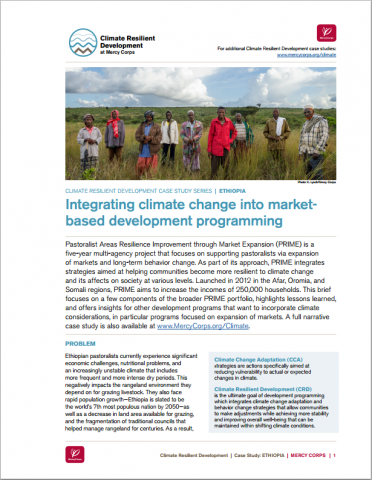Integrating Climate Change into Market-based Development Programming


This brief focuses on a few components of Mercy Corps’ broader PRIME (Pastoralist Areas Resilience Improvement through Market Expansion) portfolio in Ethiopia, highlights lessons learned, and offers insights for other development programs that want to incorporate climate considerations, in particular programs focused on expansion of markets.
This series of case studies are aimed to discover the key lessons and best practices for integrating climate change into diverse programs and contexts. They are intended to inform how CRD is designed and implemented in Mercy Corps, and share this knowledge to other practitioners and implementation for other agencies grappling with these questions.
